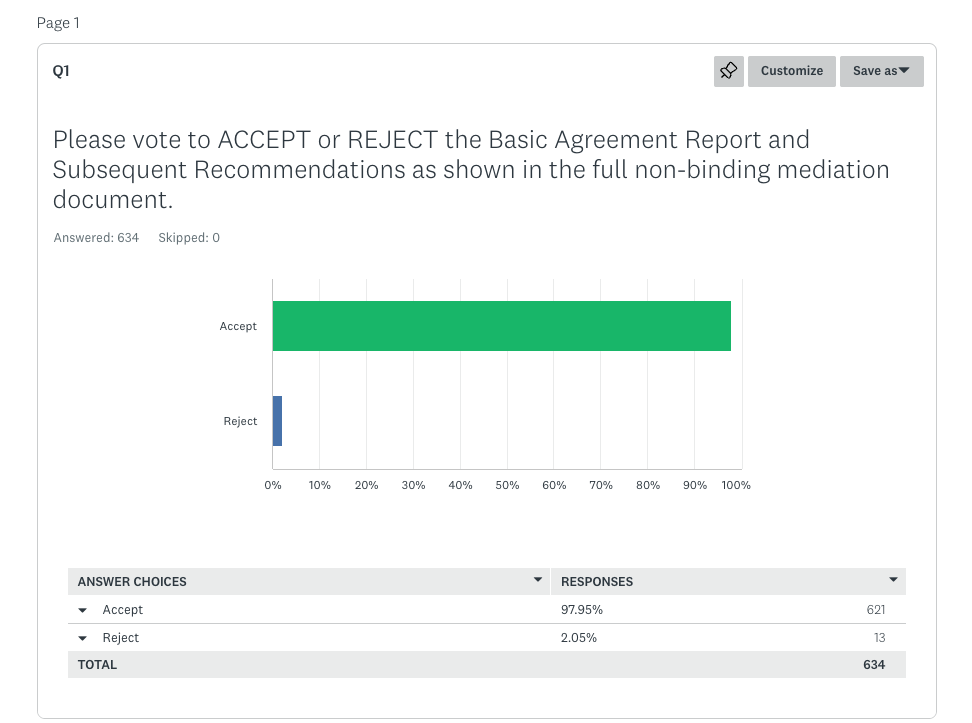A huge thank you to all the members who participated in ratifying the Basic Agreement recommendations from mediator Chris Sullivan. APSA is pleased to note that we had 634 members participate, despite the information session and voting being held over the summer.
We had 621 votes accepting the recommendations and 13 votes rejecting them, for an overall 97.75% support of accepting the changes.
This means that the ratification vote has passed and our next steps would be to have both SFU and APSA sign the document.

APSA would like to recognize and send our utmost appreciation to Jeff Bryer, Nicole Manson, David Harvey, Andrew Boden and Tracey Ferris, who formed the negotiation team.
For more information on the Basic Agreement, the Ratification negotiations and process, please see these links:
Basic Agreement Ratification Next Steps
Questions and Answers from Basic Agreement Information Session
So, could we ratify, and the Board of Governors (BoG) could say no?
On June 25, SFU Labour Relations informed APSA that the SFU's Board of Governors had approved mediator Chris Sullivan's recommendations in full. So, it's up to APSA members to ratify the recommendations for it to be adopted.
Do any of the clauses jeopardize the JUAC for pension: APSA CUPE and PolyParty?
The Employee Joint Pension Committee, comprised of APSA, CUPE, and PolyParty members, oversees our current pension plan and is a separate body from the Basic Agreement negotiations team and JUAC. The APSA Pension Advisory Committee, which has members in the EJPC, would work on any negotiations and amendments to our current pension plan. If the agreement changes, then the Basic Agreement has stipulations that will support pension negotiations in our compensation negotiation process.
What percentages of APSA and excluded are based on what total?
Please see the response to the next question.
How many excluded positions can actually materialize going from 10% to 14.8% based on the current number of APSA membership? I assume the number of positions fluctuates based on total APSA membership.
The percentages of excluded members are based on the number of current APSA members.
For example, if APSA has 1600 members, we would have a cap of 237 members excluded under APEX instead of 160 members under the previous agreement.
Are there parameters for what positions or who can be excluded?
There are parameters for excluded positions. APEX members are often in specific positions at a very senior management level or involved in the VPPEI Human Resources portfolio. We currently have a list in Appendix A of the excluded positions that would be in the current Basic Agreement. To include a position as APEX, SFU must give APSA a rationale for why the position should be excluded from the association. APSA can accept that rationale if it finds it compelling. If we don't accept the rationale from the University, we can dispute this. Typically, that rationale includes noting the confidential human resources or labour relations matters the position to be excluded would be working with.
Does any of this affect the 'poaching' of APSA members by other groups?
Unfortunately, the changes to the Basic Agreement don't affect this issue as APSA currently has no standing on the Labour Relations Board: we're not a union acting under the auspices of the Labour Code. In short, as we would only have limited powers of intervenor status, SFU would have to defend those positions if it felt it was in its interest to do so. APSA did send a submission to the Labour Relations Review Panel, as did AAPS from UBC, for consideration to receive standing as a labour association. (https://engage.gov.bc.ca/govtogetherbc/engagement…)
Additional information:
What is JUAC?
The Joint University/Association Committee is a committee with members from the University and APSA who work toward a consensus on non-monetary changes to existing APSA policies, consultation in developing new policies and addressing policy complaints. This committee also addresses non-monetary matters of mutual concern and helps to promote harmonious, collegial relationships between the University and APSA.
